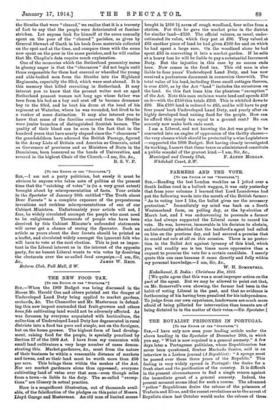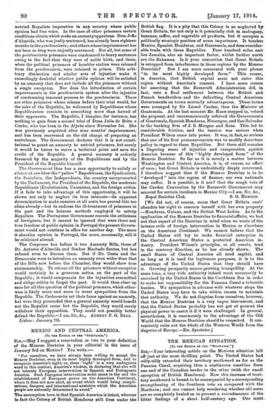THE ROYALIST PRISONERS IN PORTUGAL.
[TO THE EDITOR OF TH. " SPECT/TOR."1 Sin,—I have only now seen your leading article under the above beading in the Spectator of December 20th, in which you say, " What is now required is a general amnesty." A few days later a Portuguese politician, whose Republicanism has never been questioned, Senhor Machado Santos, said in an interview in a Lisbon journal (d Republica): "A sponge must be passed over these three years of the Republic." This feeling is very widely spread in Portugal the desire for a fresh start and the pacification of the country. It is difficult in the present circumstances to find a single reason against the immediate grant of a general amnesty. Indeed, the present moment seems ideal for such a course. The advanced "yellow" Republicans desire the release of the prisoners of Trafaria and Elves, and the recent revelations as to the arrest of Royalists since last October would make the release of these untried Royalists imperative in any country where public opinion had free voice. In the case of other prisoners certain conditions obtain which make an amnesty opportune. Dom Joao d'Almeida, who was jnetly sentenced, has already been eighteen months in the penitenciaria ; and others whose imprisonment has not been so long were unjustly sentenced. Not all, but some of the penitenciaria prisoners were condemned to heavy sentences owing to the fact that they were of noble birth, and these, when the political prisoners of humbler station were released from the penitenciaria, were retained in prison. This arbi- trary distinction and similar acts of injustice make it exceedingly doubtful whether public opinion will be satisfied by an amnesty that does not include all the prisoners without a single exception. Nor does the introduction of certain improvements in the penitenciaria system alter the injustice of condemning innocent persons to the penitenciaria. There are other prisoners whose release before their trial would, for the sake of the Republic, be welcomed by Republicans whose Republicanism consists in something more than hatred of their opponents. The Republic, I imagine, for instance, has nothing to gain from a second trial of Dona Julia de Brito e Cunha, who has been in the Aljube since November 1st. She was previously acquitted after nine months' imprisonment, and has been rearrested on the old charge of preparing an ambulance. The Government declares that it is not consti- tutional to grant an amnesty to untried prisoners, but sorely it would be better to waive a technical point and save the credit of the Republic. A general amnesty is ardently favoured by the majority of the Republicans and by the President of the Republic himself.
The Government thus has a rare opportunity to satisfy or silence at one blow the" yellow " Republicans, the Syndicalists, the Socialists, the Independents, the country unrepresented by the Parliament, the President of the Republic, the moderate Republicans (Evolutionists, Unionists), and the foreign critics. If it fails to take advantage of this opportunity, it will be shown not only to neglect its true interests—its apparent determination to make enemies at all costs has proved this too often already—but to endorse the ill-treatment of prisoners in the past and the heinous methods employed to entrap Royalists. The Portuguese Government resents the criticisms of foreigners, but it cannot be ignored that were there any true freedom of public opinion in Portugal the present Govern- ment would not continue in office for another day. The more it shackles opinion in Portugal, the more, necessarily, will it be criticized abroad.
The Congress:, has before it two Amnesty Bills, those of Dr. Antonio d'Almeida and Senhor Machado Santos, but has refused even to discuss them. But if Dr. Costa and the Democrats were to introduce an amnesty even wider than that of the Bills now before the Chamber, they would show true statesmanship. To release all the prisoners without exception would certainly be a generous action on the part of the Republic; it would compensate for the injustices committed and oblige critics to forget the past. It would thus clear up once for all this question of the political prisoners, which other- wise is likely more and more to wrest sympathies from the Republic. The Carbonarios set their faces against an amnesty, but were they persuaded that a general amnesty would benefit not the Royalist cause but the Republic, they would surely withdraw their opposition. They could not possibly better defend the Republic.—I am, Sir, Ac., AUBREY F. G. BELL.
Lisbon January NIL











































 Previous page
Previous page